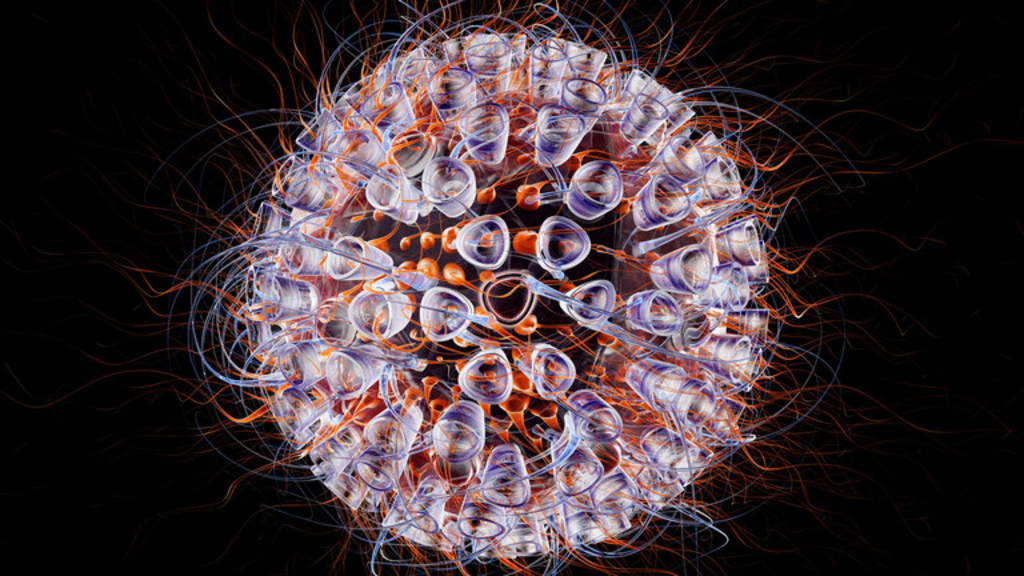HIV "hiding reservoirs" are formed earlier than thought after infection
A research team has shown for the first time that HIV, in its early days, is able to form reservoirs in which it can continue to hide during antiretroviral therapy.

Until now, the scientific community did not know exactly when or how these viral reservoirs were created, the presence of which is a major hurdle in the treatment of HIV in humans.
In a study published in the journal Immunity, scientists led by Nicolas Chaumont, a researcher at the CRCHUM Research Center and a professor at the University of Montreal, found that a small part of the virus integrates into the genome of CD4 + T cells in the first weeks of infection (the acute phase), but it does not replicate there. So it escapes the notice of the fastest diagnostic tool to date that detects active viral replication.
CD4+ T cells are the primary targets of HIV. They are the white blood cells responsible for activating the human body's defense against infection.
“With the help of analysis technology developed in our laboratory, we were able to monitor and count virus-infected T cells in human samples collected in the early stages of infection. We succeeded in detecting the presence of the virus through sequencing even when it was hiding in cells that were not involved,” Chaumont said. in virus multiplication.
To study these initial stages of virus spread, Pierre Gantner, a former postdoctoral student in Chaumont's lab and co-author of the study, had access to blood samples and inguinal lymph node tissue from 25 people in the first severely infected cohort of the HIV Research Program. Humanity US military in Thailand.
The group, called RV254 / SEARCH010, began more than 10 years ago in collaboration with the AIDS Research Center of the Thai Red Cross, and has registered nearly 800 volunteers.
Chumont and his team have been working closely with their colleagues in Thailand since the program was launched.
With their proprietary analysis technique, CRCHUM scientists succeeded in counting virus-infected CD4+ T cells during the acute phase of infection.
The number of these infected cells increased from 10 to 1,000 per million CD4+ T cells in less than seven days, demonstrating the extreme speed at which HIV spreads.
The scientists also noted that the characteristics of the cells HIV targets in the first weeks of infection varied rapidly depending on whether they were present in the blood or lymph nodes.
"For example, we noticed that a small number of Tfh cells were infected with the virus during the acute phase of the infection," Chaumont explained. "Since they play an important role in virus replication, the scientific community believed that they were the first to become infected. In fact, we counted a number "Much larger Tfh cells are infected during the chronic phase of the disease, about two months after infection. At that point, they actively contribute to the progression of the disease."
To date, these types of studies have been performed on animal models. Therefore, this is the first time that the early stages of infection in humans have been accurately described.
Much of the global research devoted to the study of HIV focuses on how to reactivate the virus in reservoirs in order to neutralize it.
"The earlier we start antiretroviral therapy, the more we stop the virus from multiplying and the more we can reduce the size of the reservoirs. We proved that in 2020," Chaumont said.
"Nevertheless, it seems clear that early antiretroviral therapy must be combined with other treatment to get the virus out of its hiding places, because at the time of diagnosis the latent reservoirs will have already been established in people with HIV."
In collaboration with scientists from the United States, the research team at Chaumont's lab is currently evaluating whether this type of treatment administered in the acute stage of infection will prevent the creation of viral reservoirs.
Source: Medical Express
A study linking artificial sweeteners to the risk of stroke!
The suspected health harms of artificial sweeteners are piling up — and now a new study has linked one type of sugar substitute with a higher risk of heart problems.
Doctor and scientist Stanley Hazen and his colleagues at the Cleveland Clinic's Lerner Research Institute wanted to see if they could find any signs that could warn people that they are more likely to have heart attacks and strokes. They found that in the blood levels of organic compounds used as sweeteners, especially erythritol. It is a commonly used sweetener in low-sugar, no-sugar, or no-carb foods.
Among a group of 1,157 patients undergoing tests at a cardiovascular clinic, those with the highest levels of these compounds in their blood had twice the risk of death or a major cardiovascular event in the following three years.
To be clear, the study did not show that erythritol comes from artificial sweeteners, or that it directly causes any cardiovascular problems.
Some nutrition scientists not involved in the research have criticized the study, saying its laboratory experiments are "unrealistic" and its observational results limited because they did not take into account how erythritol is produced in the body.
But the researchers say their findings are sufficient to warrant additional investigation.
"Our findings suggest the need for further safety studies examining the long-term effects of artificial sweeteners in general, and erythritol specifically, on the risk of heart attacks and strokes, especially in patients at risk for cardiovascular disease," the researchers wrote in their publication. .
Artificial sweeteners are thought to be chemically inert, but scientists are finding that these low-calorie compounds are not necessarily devoid of health consequences.
And while it is naturally found in very small amounts in fruits and vegetables, levels of sweeteners like erythritol can be up to 1,000 times higher in processed foods.
Research shows that artificial sweeteners can mess with the microbes in our gut in a way that leads to weight gain and diabetes, and may increase the risk of cancer. And part of the problem is that while artificial sweeteners contain fewer calories than the sugars they replace—and this may help some people cut down on their intake—they taste sweeter and encourage our bodies to crave more.
"There is an ongoing debate about the safety of sweeteners - in part because some studies show an increased risk of chronic disease among those who consume sweeteners, particularly in soft drinks," explains Gunther Künel, professor of nutrition and food science at the University of Reading in the UK.
This new study found a link between erythritol levels in the blood and the risk of a future heart attack or stroke - an association that was also seen in two other groups of about 3,000 people, taken together, from the United States and Denmark.
This led Hazen and colleagues to investigate possible mechanisms by which erythritol might increase risk, through laboratory studies using blood samples from a small group of eight healthy volunteers.
Blood levels of erythritol peaked and remained elevated for two to three days after the volunteers drank a drink sweetened with erythritol, before returning to normal. Adding erythritol to whole blood samples also increased blood viscosity and other measures related to blood clotting, with similar effects seen in animal studies.
This somehow explains how consuming high levels of artificial sweeteners can trigger a cascade of changes in the blood that may lead to a cardiovascular event.
"His paper effectively shows multiple pieces of a jigsaw puzzle to explore the effects of erythritol," says Duane Mellor, a nutritionist at Aston University.
But he says the study doesn't rule out other sources of erythritol in the blood, which can also be made from other sugars inside our bodies, especially if we eat a lot and move around little.
The amount of added erythritol the volunteers consumed was much higher than the amounts allowed in store-bought drinks in the UK. But the study authors argue that the amount chosen reflects the daily intake of some Americans.
Regulators are alerted to the potential health risks of artificial sweeteners; Their mission is to find out which levels of food additives are safe for consumption based on the available evidence.
And just last year, a study of more than 100,000 volunteers from France reported an increased risk of heart disease with higher dietary intakes of artificial sweeteners, which participants logged daily.
Observational studies such as these better reflect people's usual diets, but they are not without their shortcomings. The challenge is to sift through the many other lifestyle factors that also affect heart health in significant ways, such as physical activity, and try to isolate the potential effects of a particular food or additive from whole meals.
Nutritional epidemiologist Nita Forouhi of the University of Cambridge says the latest study expands the scope of previous research on the potential health harms of artificial sweeteners and its findings warrant further research.
However, because the people in the study already had many cardiovascular risk factors, it is difficult to generalize the study results to a healthy population. Three-quarters of the study participants had high blood pressure or coronary artery disease, and one-fifth had diabetes.
Until we know more about the long-term health effects of erythritol and other artificial sweeteners, it's best to stick to what we know is good for our overall health: reducing your sugar intake by limiting sweetened beverages and highly processed foods.
The research has been published in the journal Nature Medicine.
Source: ScienceAlert
About the Creator
News Correct
Information WorldWide MORE INFORMATION






Comments
There are no comments for this story
Be the first to respond and start the conversation.